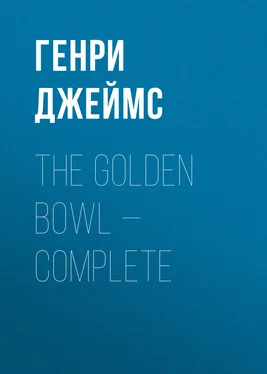Генри Джеймс - The Golden Bowl — Complete
Здесь есть возможность читать онлайн «Генри Джеймс - The Golden Bowl — Complete» — ознакомительный отрывок электронной книги совершенно бесплатно, а после прочтения отрывка купить полную версию. В некоторых случаях можно слушать аудио, скачать через торрент в формате fb2 и присутствует краткое содержание. Жанр: foreign_prose, foreign_antique, на английском языке. Описание произведения, (предисловие) а так же отзывы посетителей доступны на портале библиотеки ЛибКат.
- Название:The Golden Bowl — Complete
- Автор:
- Жанр:
- Год:неизвестен
- ISBN:нет данных
- Рейтинг книги:3 / 5. Голосов: 1
-
Избранное:Добавить в избранное
- Отзывы:
-
Ваша оценка:
- 60
- 1
- 2
- 3
- 4
- 5
The Golden Bowl — Complete: краткое содержание, описание и аннотация
Предлагаем к чтению аннотацию, описание, краткое содержание или предисловие (зависит от того, что написал сам автор книги «The Golden Bowl — Complete»). Если вы не нашли необходимую информацию о книге — напишите в комментариях, мы постараемся отыскать её.
The Golden Bowl — Complete — читать онлайн ознакомительный отрывок
Ниже представлен текст книги, разбитый по страницам. Система сохранения места последней прочитанной страницы, позволяет с удобством читать онлайн бесплатно книгу «The Golden Bowl — Complete», без необходимости каждый раз заново искать на чём Вы остановились. Поставьте закладку, и сможете в любой момент перейти на страницу, на которой закончили чтение.
Интервал:
Закладка:
That, none the less, was but a flicker; what made the real difference, as I have hinted, was his mute passage with Maggie. His daughter’s anxiety alone had depths, and it opened out for him the wider that it was altogether new. When, in their common past, when till this moment, had she shown a fear, however dumbly, for his individual life? They had had fears together, just as they had had joys, but all of hers, at least, had been for what equally concerned them. Here of a sudden was a question that concerned him alone, and the soundless explosion of it somehow marked a date. He was on her mind, he was even in a manner on her hands—as a distinct thing, that is, from being, where he had always been, merely deep in her heart and in her life; too deep down, as it were, to be disengaged, contrasted or opposed, in short objectively presented. But time finally had done it; their relation was altered: he SAW, again, the difference lighted for her. This marked it to himself—and it wasn’t a question simply of a Mrs. Rance the more or the less. For Maggie too, at a stroke, almost beneficently, their visitor had, from being an inconvenience, become a sign. They had made vacant, by their marriage, his immediate foreground, his personal precinct—they being the Princess and the Prince. They had made room in it for others—so others had become aware. He became aware himself, for that matter, during the minute Maggie stood there before speaking; and with the sense, moreover, of what he saw her see, he had the sense of what she saw HIM. This last, it may be added, would have been his intensest perception had there not, the next instant, been more for him in Fanny Assingham. Her face couldn’t keep it from him; she had seen, on top of everything, in her quick way, what they both were seeing.
IX
So much mute communication was doubtless, all this time, marvellous, and we may confess to having perhaps read into the scene, prematurely, a critical character that took longer to develop. Yet the quiet hour of reunion enjoyed that afternoon by the father and the daughter did really little else than deal with the elements definitely presented to each in the vibration produced by the return of the church-goers. Nothing allusive, nothing at all insistent, passed between them either before or immediately after luncheon—except indeed so far as their failure soon again to meet might be itself an accident charged with reference. The hour or two after luncheon—and on Sundays with especial rigour, for one of the domestic reasons of which it belonged to Maggie quite multitudinously to take account—were habitually spent by the Princess with her little boy, in whose apartment she either frequently found her father already established or was sooner or later joined by him. His visit to his grandson, at some hour or other, held its place, in his day, against all interventions, and this without counting his grandson’s visits to HIM, scarcely less ordered and timed, and the odd bits, as he called them, that they picked up together when they could—communions snatched, for the most part, on the terrace, in the gardens or the park, while the Principino, with much pomp and circumstance of perambulator, parasol, fine lace over-veiling and incorruptible female attendance, took the air. In the private apartments, which, occupying in the great house the larger part of a wing of their own, were not much more easily accessible than if the place had been a royal palace and the small child an heir-apparent—in the nursery of nurseries the talk, at these instituted times, was always so prevailingly with or about the master of the scene that other interests and other topics had fairly learned to avoid the slighting and inadequate notice there taken of them. They came in, at the best, but as involved in the little boy’s future, his past, or his comprehensive present, never getting so much as a chance to plead their own merits or to complain of being neglected. Nothing perhaps, in truth, had done more than this united participation to confirm in the elder parties that sense of a life not only uninterrupted but more deeply associated, more largely combined, of which, on Adam Verver’s behalf, we have made some mention. It was of course an old story and a familiar idea that a beautiful baby could take its place as a new link between a wife and a husband, but Maggie and her father had, with every ingenuity, converted the precious creature into a link between a mamma and a grandpapa. The Principino, for a chance spectator of this process, might have become, by an untoward stroke, a hapless half-orphan, with the place of immediate male parent swept bare and open to the next nearest sympathy.
They had no occasion thus, the conjoined worshippers, to talk of what the Prince might be or might do for his son—the sum of service, in his absence, so completely filled itself out. It was not in the least, moreover, that there was doubt of him, for he was conspicuously addicted to the manipulation of the child, in the frank Italian way, at such moments as he judged discreet in respect to other claims: conspicuously, indeed, that is, for Maggie, who had more occasion, on the whole, to speak to her husband of the extravagance of her father than to speak to her father of the extravagance of her husband. Adam Verver had, all round, in this connection, his own serenity. He was sure of his son-in-law’s auxiliary admiration—admiration, he meant, of his grand-son; since, to begin with, what else had been at work but the instinct—or it might fairly have been the tradition—of the latter’s making the child so solidly beautiful as to HAVE to be admired? What contributed most to harmony in this play of relations, however, was the way the young man seemed to leave it to be gathered that, tradition for tradition, the grandpapa’s own was not, in any estimate, to go for nothing. A tradition, or whatever it was, that had flowered prelusively in the Princess herself—well, Amerigo’s very discretions were his way of taking account of it. His discriminations in respect to his heir were, in fine, not more angular than any others to be observed in him; and Mr. Verver received perhaps from no source so distinct an impression of being for him an odd and important phenomenon as he received from this impunity of appropriation, these unchallenged nursery hours. It was as if the grandpapa’s special show of the character were but another side for the observer to study, another item for him to note. It came back, this latter personage knew, to his own previous perception—that of the Prince’s inability, in any matter in which he was concerned, to CONCLUDE. The idiosyncrasy, for him, at each stage, had to be demonstrated—on which, however, he admirably accepted it. This last was, after all, the point; he really worked, poor young man, for acceptance, since he worked so constantly for comprehension. And how, when you came to that, COULD you know that a horse wouldn’t shy at a brass-band, in a country road, because it didn’t shy at a traction-engine? It might have been brought up to traction-engines without having been brought up to brass-bands. Little by little, thus, from month to month, the Prince was learning what his wife’s father had been brought up to; and now it could be checked off—he had been brought, up to the romantic view of principini. Who would have thought it, and where would it all stop? The only fear somewhat sharp for Mr. Verver was a certain fear of disappointing him for strangeness. He felt that the evidence he offered, thus viewed, was too much on the positive side. He didn’t know—he was learning, and it was funny for him—to how many things he HAD been brought up. If the Prince could only strike something to which he hadn’t! This wouldn’t, it seemed to him, ruffle the smoothness, and yet MIGHT, a little, add to the interest.
Читать дальшеИнтервал:
Закладка:
Похожие книги на «The Golden Bowl — Complete»
Представляем Вашему вниманию похожие книги на «The Golden Bowl — Complete» списком для выбора. Мы отобрали схожую по названию и смыслу литературу в надежде предоставить читателям больше вариантов отыскать новые, интересные, ещё непрочитанные произведения.
Обсуждение, отзывы о книге «The Golden Bowl — Complete» и просто собственные мнения читателей. Оставьте ваши комментарии, напишите, что Вы думаете о произведении, его смысле или главных героях. Укажите что конкретно понравилось, а что нет, и почему Вы так считаете.












